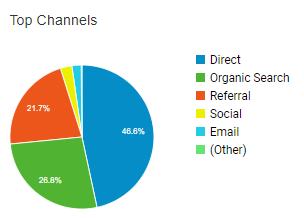Finally, we can now safely say that the year of mobile has arrived. According to Nielsen, 50% of US...
Is your search traffic really helping your business?
 Most people are pretty happy when they take a look at their web site traffic and see that a large share of traffic coming to their site from search engines. The natural reaction to these numbers is likely to be “Isn’t this great? Look at all these new prospects who are finding me on the web!” But in many cases, such assumptions about who’s finding your site via search may be completely wrong. Before I give you some tips on how you can improve your search results, let’s take a look at how people use search engines today.
Most people are pretty happy when they take a look at their web site traffic and see that a large share of traffic coming to their site from search engines. The natural reaction to these numbers is likely to be “Isn’t this great? Look at all these new prospects who are finding me on the web!” But in many cases, such assumptions about who’s finding your site via search may be completely wrong. Before I give you some tips on how you can improve your search results, let’s take a look at how people use search engines today.
How do people search?
It all begins with a need or interest—something inspires a person to search for a certain topic. Let’s use a hypothetical example of person considering buying a new camera. A typical search begins pretty broadly. Type “camera” into Google (92% of searches happen on Google according to statcounter); the results page brings up a bunch of links (over 4.9 billion) for places where you can buy cameras, some photos of cameras, links to manufacturer’s sites, and so on. Great—but you’re not even sure what you’re looking for yet. So you go back to the top of the page and start adding qualifiers to your search terms. Perhaps you go with “Camera Reviews” and are presented with a variety of sites offering reviews of the latest cameras. You start reading the reviews, go back to the search engine and search patterns start to diverge…maybe you want an “SLR camera”, “digital video camera”, “10 megapixel camera” or maybe even a “film camera.” This research process can last minutes, hours, days—even weeks depending on the searchers interest level. Somewhere along the way the searcher will start to get specific and introduce branded searches into the mix (e.g. “canon camera” “kodak camera”) and then near the end of the purchase cycle the searcher will start using specific model number as search terms.
Looking at your search traffic
Now that you have more of an understanding of how your prospects are searching, let’s take a closer look at that large share of visitors coming to your site a search. When looking at search data, most people are surprised to find out how much of their search traffic comes from branded terms related to your business. It’s not uncommon to see 60% or greater search volume from visitors coming to your site after typing your company name into a search engine. This isn’t necessarily a bad thing; search is making sure that people aware of your brand are able to find your site—but what about those prospects? If you’re not getting much traffic from the early, more general searchers (“10 megapixel camera”) how are you going to be sure you’re in the consideration set when they are at the end of their purchase cycle and ready to buy? If your brand hasn’t come up earlier in the purchase cycle, you won’t be included in those final branded searches. And, if you haven’t created the right content for mobile searchers, prospects will see product information links instead of the driving directions and phone numbers they need on their mobile devices.
Tips for improving the impact of search
So where do you start? The first and most important step is to spend some time looking at the keywords that are driving traffic to your site and then more importantly, start making a list of the words that aren’t driving traffic. That’s where want to start focusing on with your paid search and/or search engine optimization efforts. Another good practice is to do some of the searches yourself, see what comes up. Who’s advertising? Who’s in the natural search results? and don’t forget to search on your mobile device too. The results may surprise you. Another common error when creating your search term list is to start using industry jargon instead of using the words your consumers use. Acronyms are great for use among peers, but are often confusing to external audiences. Another often overlooked source of insight is your sales force. They talk with your customers every day and can often provide keen insight as to the things that are on the minds of your prospects.
Your word list is the most important part of any search effort, take the time to understand your traffic, consumers and your business and you’ll be well on your way to having search truly help your business.



